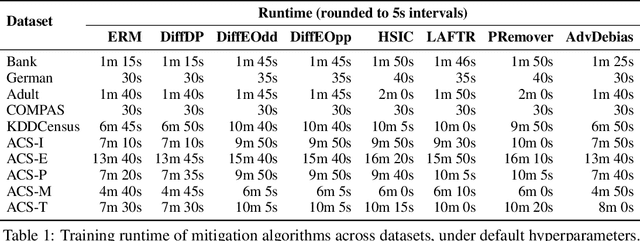Different Horses for Different Courses: Comparing Bias Mitigation Algorithms in ML
Paper and Code
Nov 19, 2024



With fairness concerns gaining significant attention in Machine Learning (ML), several bias mitigation techniques have been proposed, often compared against each other to find the best method. These benchmarking efforts tend to use a common setup for evaluation under the assumption that providing a uniform environment ensures a fair comparison. However, bias mitigation techniques are sensitive to hyperparameter choices, random seeds, feature selection, etc., meaning that comparison on just one setting can unfairly favour certain algorithms. In this work, we show significant variance in fairness achieved by several algorithms and the influence of the learning pipeline on fairness scores. We highlight that most bias mitigation techniques can achieve comparable performance, given the freedom to perform hyperparameter optimization, suggesting that the choice of the evaluation parameters-rather than the mitigation technique itself-can sometimes create the perceived superiority of one method over another. We hope our work encourages future research on how various choices in the lifecycle of developing an algorithm impact fairness, and trends that guide the selection of appropriate algorithms.
 Add to Chrome
Add to Chrome Add to Firefox
Add to Firefox Add to Edge
Add to Edge